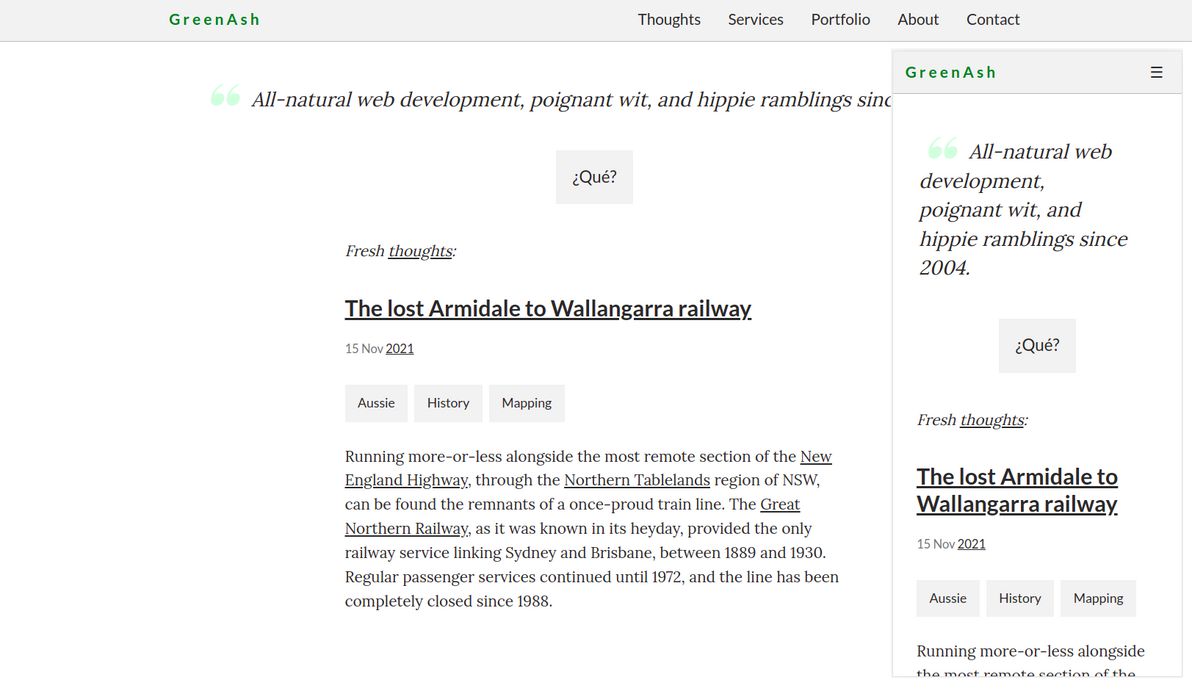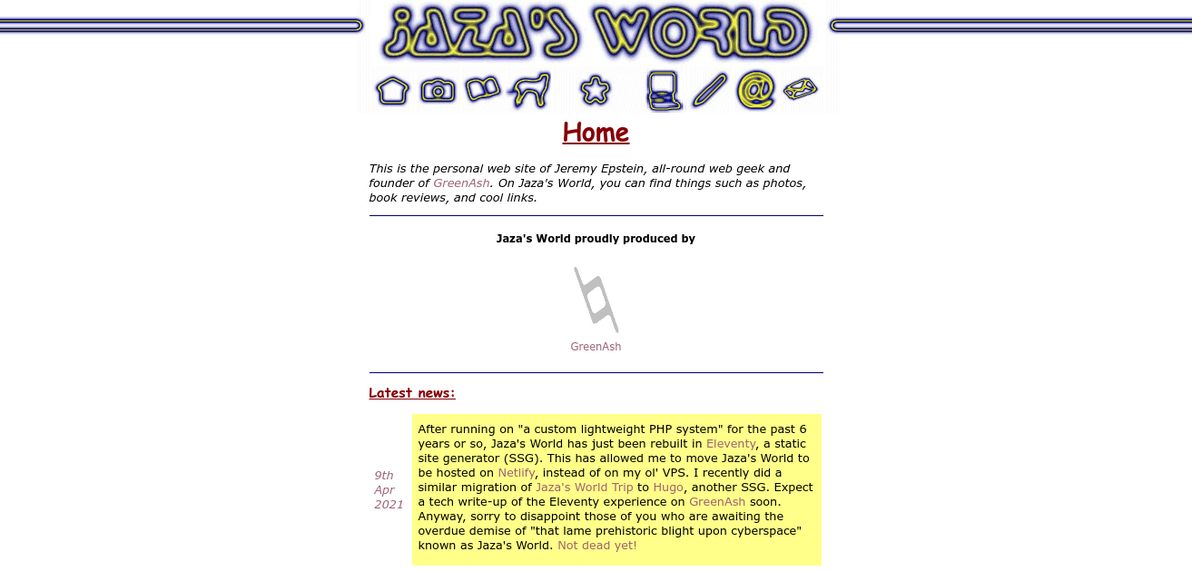
GreenAsh v5 marks the culmination of my continuing mission, to convert over all of my personal sites, and all of the other sites that I still host slash maintain, to use a Static Site Generator (SSG). As with some other sites of mine, GreenAsh is now powered by Eleventy, and is now hosted on Netlify.
As was the case with v4, this new version isn't a complete redesign, it's a realign. First and foremost, the new design's aim is for the thought-reading experience to be a delightful one, with improved text legibility and better formatting of in-article elements. The new design is also (long overdue for GreenAsh!) fully responsive from the ground up, catering for mobile display just as much as desktop.
After nearly 18 years, this is the first ever version of GreenAsh to lack a database-powered back-end. 'Tis a bittersweet parting for me. The initial years of GreenAsh, powered by the One True™ LAMP Stack – originally, albeit briefly, using a home-grown PHP app, and then, for much longer, using Drupal – were (for me) exciting times that I will always remember fondly.
The past decade (and a bit) of the GreenAsh chronicles, powered by Django, has seen the site mature, both technology-wise and content-wise. In this, the latest chapter of The Life of GreenAsh, I hope not just to find some juniper bushes, but also to continue nurturing the site, particularly by penning thoughts of an ever higher calibre.
The most noteworthy feature that I've built in this new version, is a comment moderation and publishing system powered mainly by Netlify Functions. I'm quite proud of what I've cobbled together, and I'll be expounding upon it, in prose coming soon to a thought near you. Watch this space!
Some of the things that I had previously whinged about as being a real pain in Hugo, such as a tag cloud and a monthly / yearly archive, I've gotten built quite nicely here, using Eleventy, just as I had hoped I would. Some of the functionality that I had manually ported from Drupal to Django (i.e. from PHP to Python), back in the day, such as the autop filter, and the inline image filter, I have now ported from Django to Eleventy (i.e. from Python to Node.js).
As a side effect of the site now being hosted on Netlify, the site's source code is (for the first time) publicly available on GitHub, and even has an open-source license. So feel free to use it as you will.
All of the SSG-powered sites that I've built over the past year, have their media assets (mainly consisting of images) stored in S3 and served by CloudFront (and, in some cases, the site itself is also stored in S3 and is served by CloudFront, rather than being hosted on Netlify). GreenAsh v5 is no exception.
On account of the source code now being public, and of there no longer being any traditional back-end server, I've had to move some functionality out of GreenAsh, that I previously had bundled in to Django. In particular, I migrated my invoice data for freelance work – which had been defined as Django models, and stored in the sites's database, and exposed in the Django admin – to a simple Google Sheet, which, honestly (considering how little work I do on the side these days), will do, for the foreseeable future. And I migrated my résumé – which had been a password-protected Django view – to its own little password-protected S3 / CloudFront site.
The only big feature of v4 that's currently missing in v5, is site search. This is, of course, much easier to implement for a traditional back-end-powered site, than it is for an SSG-powered site. I previously used Whoosh with Django. Anyway, site search is only a nice-to-have feature, and this is only a small site that's easily browsable, and (in the meantime) folks can just use Google with the site: operator instead. And I hear it's not that hard to implement search for Eleventy these days, so maybe I'll whack that on to GreenAsh v5 sometime soon too.
I've been busy, SSG-ifying all my old sites, and GreenAsh is the lucky last. Now that GreenAsh v5 is live (and now that I've migrated various other non-web-facing things – mainly migrating backups of things to S3 buckets), that means I don't need a VPS anymore! I'll be writing a separate thought, sometime soon, about the pros and cons of still having a VPS in this day and age.
Hope y'all like the new décor.
]]>
First and foremost, Eleventy allows virtually all the custom code you might need. This is in stark contrast to Hugo, with which my biggest gripe was its lack of support for any custom code whatsoever, except for template code. The most basic code hook that Eleventy supports – filters – will get you pretty far: I whipped up some filters for date formatting, for array slicing, for getting parent pages, and for getting subsets of tags. Eleventy's custom collections are also handy: for example, I defined a collection for my nav menu items. I didn't find myself needing to write any Eleventy plugins of my own, but my understanding is that you have access to the same Eleventy API methods in a plugin, as you do in a regular site-level .eleventy.js file.
One of Eleventy's most powerful features is its pagination. It's implemented as a "core plugin" (Pagination.js is the only file in Eleventy core's Plugins directory), but it probably makes sense to just think of it as a core feature, period. Its main use case is, unsurprisingly, for paging a list of content. That is, for generating /articles/, /articles/page/2/, /articles/page/99/, and so on. But it can handle any arbitrary list of data, it doesn't have to be "page content". And it can generate pages based on any permalink pattern, which you can set to not even include a "page number" at all. In this way, Eleventy can generate pages "dynamically" from data! Jaza's World doesn't have a monthly archive, but I could have created one using Eleventy pagination in this way (whereas a dynamically-generated monthly archive is currently impossible in Hugo, so I resorted to just manually defining a page for each month).

Eleventy's pagination still has a few rough edges. In particular, it doesn't (really) currently support "double pagination". That is, /section-foo/parent-bar-generated-by-pagination/child-baz-also-generated-by-pagination/ (although it's the same issue even if parent-bar is generated just by a permalink pattern, without using pagination at that parent level). And I kind of needed that feature, like, badly, for the Gallery section of Jaza's World. So I added support for this to Eleventy myself, by way of letting the pagination key be determined dynamically based on a callback function. As of the time of writing, that PR is still pending review (and so for now, on Jaza's World, I'm running a branch build of Eleventy that contains my change). Hopefully it will get in soon, in which case the enhancement request for double pagination (which is currently one of three "pinned" issues in the Eleventy issue tracker) should be able to be considered fulfilled.
JavaScript isn't my favourite language. I've been avoiding heavy front-end JS coding (with moderate success) for some time, and I've been trying to distance myself from back-end Node.js coding too (with less success). Python has been my language of choice for yonks now. So I'm giving Eleventy a good rap despite it being all JS, not because of it. I like that it's a minimalist JS tool, that it's not tied to any massive framework (such as React), and that it appears to be quite performant (I haven't formally benchmarked it against Hugo, but for my modest needs so far, Eleventy has been on par, it generates Jaza's World with its 500-odd pages in about 2 seconds). And hey, JS is as good a language as any these days, for the kind of script snippets you need when using a static site generator.
Eleventy has come a long way in a short time, but nevertheless, I don't feel that it's worthy yet of being called a really solid tool. Hugo is certainly a more mature piece of software, and a more mature community. In particular, Eleventy feels like a one-man show (Hugo suffers from this too, but it seems to have developed a slightly better contributor base). Kudos to zachleat for all the amazing work he has done and continues to do, but for Eleventy to be sustainable long-term, it needs more of a team.
With Jaza's World, I played around with Eleventy a fair bit, and got a real site built and deployed. But there's more I could do. I didn't bother moving any of my custom code into their own files, nor into separate plugins, I just left them in .eleventy.js. I also didn't bother writing JS unit tests – for a more serious project, what I'd really like to do, is to have tests that run in a CI pipeline (ideally in GitHub Actions), and to only kick off a Netlify deployment once there's a green build (rather than the usual setup of Netlify deploying as soon as the master branch in GitHub is updated).
Site building in Eleventy has been fun, I reckon I'll be doing more of it!
]]>